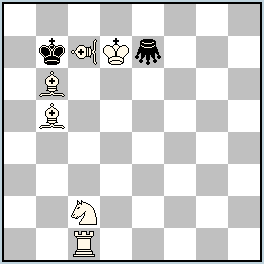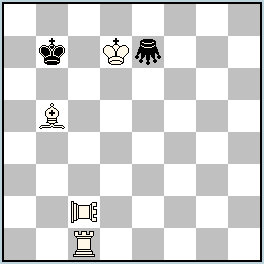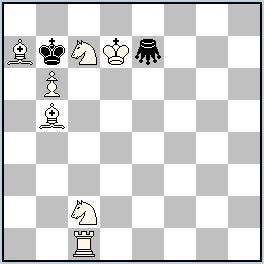| No.456, 456.1 János Mikitovics (Hungary) |
Original Problems, Julia’s Fairies – 2013 (III): September- December ?Previous ; ?Next ; ?List 2013(III) Please send your original fairy problems to: julia@juliasfairies.com |
No.456 by János Mikitovics – Long play with an interesting final! And the first congratulation with Winter Holidays! (JV)
And two author’s improvements to the problem: No.456.1 and No.456.2.
Definitions:
Grasshopper(G): Moves along Q-lines over another unit of either color to the square immediately beyond that unit. A capture may be made on arrival, but the hurdle is not affected.
Princess: Combines Bishop and Knight (B + S).
Rook-Locust(LR): (0,1) Locust. Operates along Rook lines.
Locust(L): (0,1)+(1,1) Locust. Moves along Queen lines only by capturing an enemy unit, arriving on the square immediately beyond that unit, which must be vacant.
Swapping Kings: If a move exposes the opponent’s King to a check under normal rules, then the two Kings are switched, and check or checkmate is newly evaluated, and of course a move is illegal if after such a switch one’s own King is in check.
|
No.456 János Mikitovics
Hungary
original – 19.12.2013
Merry Christmas 2013 & Happy New Year 2014!
 ser-h#22* (6+2 )
Grasshopper e7 Princess c7 Swapping-Kings Solution: (click to show/hide)
|
No.456.1 János Mikitovics
Hungary
Version of No.456, 20.12.2013
Merry Christmas 2013 & Happy New Year 2014!
 ser-h#20 (4+2 )
Grasshopper e7 Rook-Locust c2 Swapping-Kings Solution: (click to show/hide)
|
|
No.456.2 János Mikitovics
Hungary
Version of No.456, 24.12.2013
Merry Christmas 2013 & Happy New Year 2014!
 ser-h#24* (7+2)
Grasshopper e7 Swapping-Kings Solution: (click to show/hide)
|
|



There’s an unusual feature here: the only Princess on the board is captured immediately, without ever doing anything actively! But still it has to be: the Bishop part determines the order of the first two moves, and the Knight part stops the cook 1,Ka8 2,Kb7 Bc6[Kb7Kd7]#.
Many thanks for your comment!
Here is the improved problem without a Princess:
Merry Christmas 2013 & Happy New Year 2014!
White Ba7 Kd7 Pb6 Bb5 Sc2 Rc1 (6)
Black Kb7 Ge7 (2)
ser-h#24
Grasshopper e7
Swapping-Kings
1.Ge7-c7 2.Gc7*a7 3.Ga7-c7 4.Kb7*b6 5.Kb6-c5 6.Gc7-c4 7.Kc5-d5 8.Kd5-e4 9.Ke4-d3 10.Kd3-c3 11.Gc4*c2 12.Kc3-b3 13.Gc2-a4 14.Kb3-a2 15.Ga4-a1 16.Ga1-a3 17.Ka2-b3 18.Kb3-b4 19.Ga3-c5 20.Kb4-a5 21.Ka5-b6 22.Gc5-a7 23.Ga7-e7 24.Kb6-b7 Rc1-c7[Kb7Kd7] #
Here is the most economical setting in an aristocrat form and with one capture only:
Merry Christmas 2013 & Happy New Year 2014!
White Kd7 Bb5 LRc2 Rc1 (4)
Black Kb7 Ge7 (2)
ser-h#20
wRook locust c2
bGrasshopper e7
Swapping-Kings
1.Ge7-c7 2.Gc7-a7 3.Kb7-b6 4.Kb6-a5 5.Ga7-a4 6.Ka5-b4 7.Kb4-b3 8.Ga4*c2 9.Gc2-a4 10.Kb3-a2 11.Ga4-a1 12.Ga1-a3 13.Ka2-b3 14.Kb3-b4 15.Ga3-c5 16.Kb4-a5 17.Ka5-b6 18.Gc5-a7 19.Ga7-e7 20.Kb6-b7 Rc1-c7[Kb7Kd7] #
The most economical position introduces another fairy piece again, but this one has the essential function of stopping the route over c5 – which in turn makes the natural timing of the first three moves possible, and also makes it possible to have only the thematical capture. So I believe the Rook Locust is well motivated here.
This is clearly much better!
You motivated me to a better work! Thank you!
I don’t understand why Grasshopper can’t capture rook in c7. Can somebody please explain this ?
Merry Xmas to all composers around the world
Kenneth
Simple: because bK is on d7 in the final position, there is a double check from Rc7+Bb5.
Merry Xmas to you all from me too!
I thought that it was author’s intention to have immediate mate set play 1…Bc6[Kb7↔Kd7]# in diagram position, but it is lost in the improvement…
Yes, Georgy, you’re right!
Unfortunately, I forgot about the set play of the original problem : 1…Bb5-c6[Kb7Kd7] #, which is lost indeed in “the improvements”.
Thank you for your remark!
Here is a version with one fairy piece only and with a set play:
White Ba7 Sc7 Kd7 Pb6 Bb5 Sc2 Rc1 (7)
Black Kb7 Ge7 (2)
ser-h#24
bGrasshopper e7
Swapping-Kings
Set play: 1…Bb5-c6[Kb7Kd7] #
Real play: 1.Ge7*c7 2.Gc7*a7 3.Ga7-c7 4.Kb7*b6 5.Kb6-c5 6.Gc7-c4 7.Kc5-d5 8.Kd5-e4 9.Ke4-d3 10.Kd3-c3 11.Gc4*c2 12.Kc3-b3 13.Gc2-a4 14.Kb3-a2 15.Ga4-a1 16.Ga1-a3 17.Ka2-b3 18.Kb3-b4 19.Ga3-c5 20.Kb4-a5 21.Ka5-b6 22.Gc5-a7 23.Ga7-e7 24.Kb6-b7 Rc1-c7[Kb7Kd7] #
Please, try to develop the problem, if you like the idea.
Janos